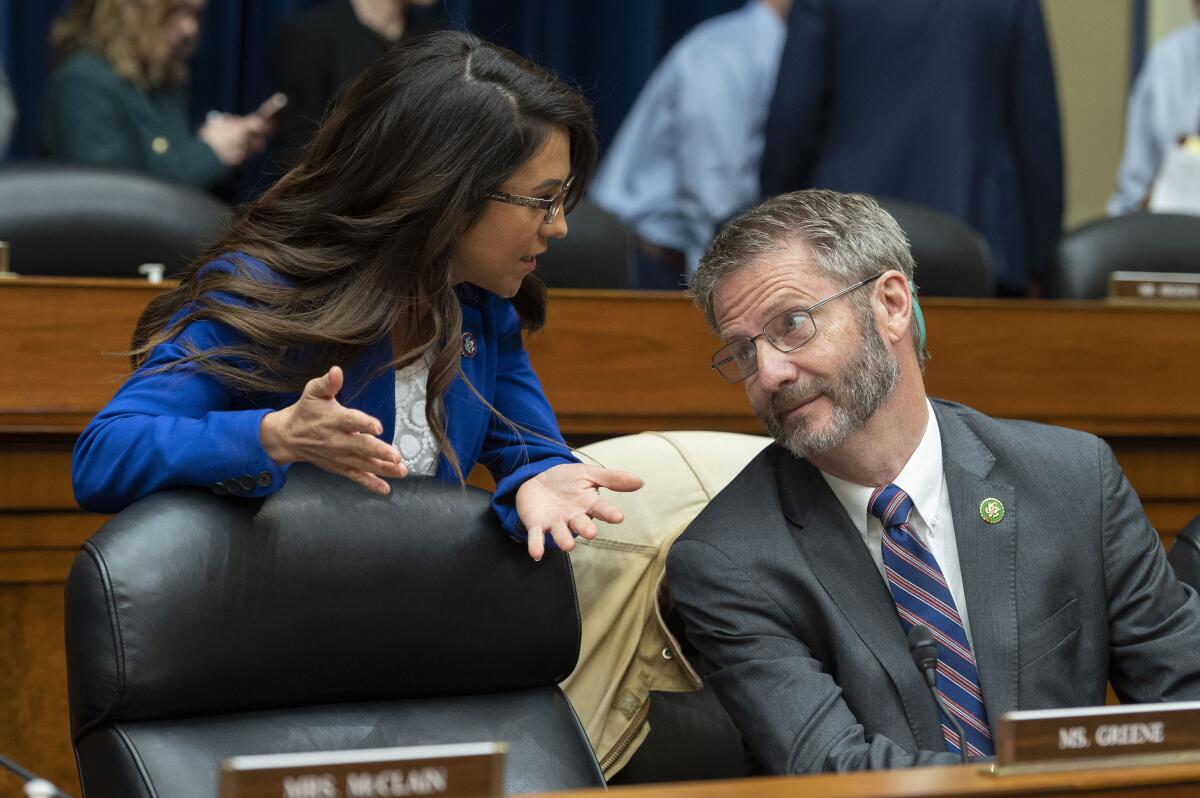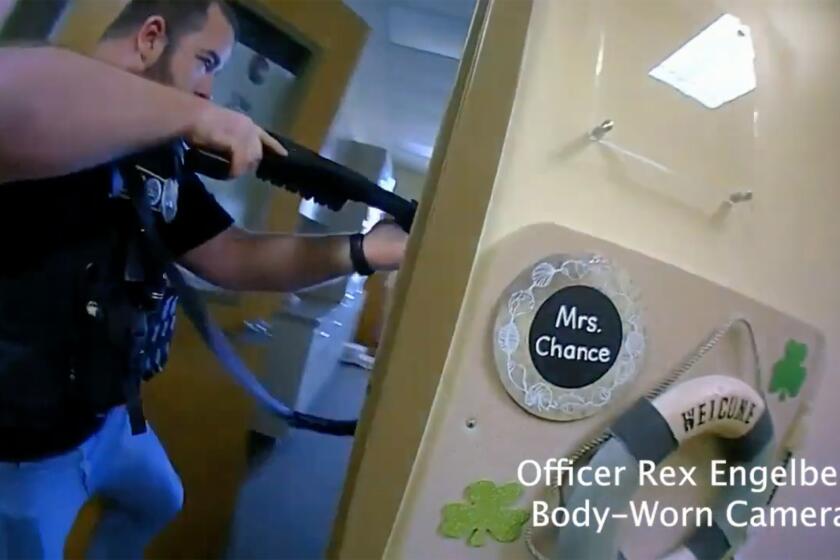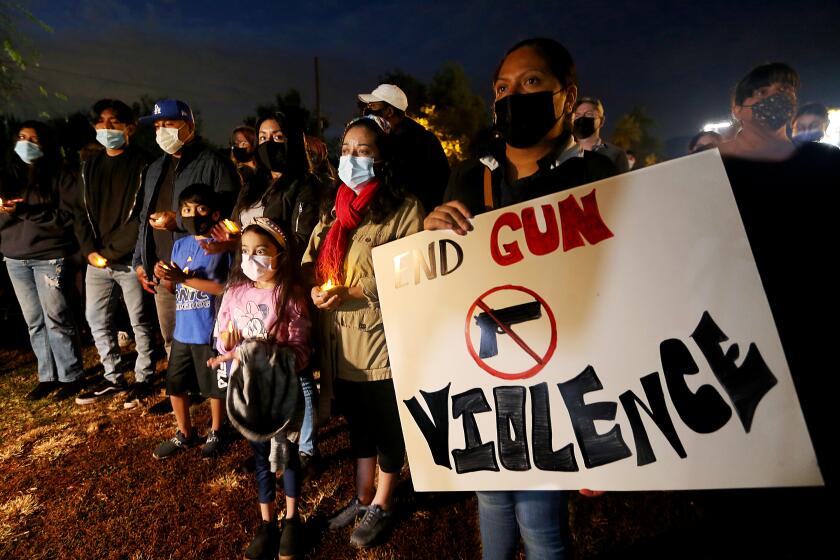Congress can’t do anything to prevent mass shootings? Only because Republicans won’t try

- Share via
“It’s a horrible, horrible situation, and we’re not going to fix it.”
There you have it: With that throwaway line to reporters on the Capitol steps Monday, Rep. Tim Burchett of Tennessee summed up the Republican Party’s deliberate impotence against an epidemic of gun violence and mass shootings that distinguishes this nation from just about all others.
Six of Burchett’s fellow Tennesseans — three 9-year-olds and three adults roughly his age — had just been slaughtered at a private Presbyterian school in Nashville by the latest killer wielding assault weapons. The congressman was saying that “we can’t fix” the problem of record shootings. Yet “won’t” applies as well to Republicans. Predictably, they’ve stuck to their two-pronged agenda on gun massacres: thoughts and prayers. (Perversely, Republican Rep. Barry Moore of Alabama, has another idea. His bill, which he unveiled at a gun store, would designate the AR-15 as the “National Gun of the United States.”)
Opinion Columnist
Jackie Calmes
Jackie Calmes brings a critical eye to the national political scene. She has decades of experience covering the White House and Congress.
Can’t, won’t — the fact is the Congress can do something and once did do something, to demonstrably good but short-lived effect. In 1994, a Democratic-controlled Congress and President Clinton banned mass murderers’ weapon of choice, military-style assault rifles, along with the high-capacity magazines that so horribly compound the guns’ lethality.
It should try to do so again, as President Biden has urged for the umpteenth time. That a Republican-majority House insists it can’t or won’t act is all the more reason to bring nationwide pressure on Congress to try.
The assault weapon ban enacted three decades ago was a personal victory for California’s then-freshman Sen. Dianne Feinstein, who was motivated by a 1993 attack at a San Francisco law firm that left eight people dead, as well as by the 1989 shootings at a Stockton schoolyard that killed five kids and injured 27, plus a teacher.
Audrey Hale, 28, legally purchased seven firearms and used three of them in the shooting at a Christian school that left six people dead, authorities said.
But to secure enough votes back then, proponents had to compromise by exempting the assault-style rifles and magazines Americans already possessed. And, alas, they also had to agree that the ban would lapse after 10 years unless a future Congress and president extended it. Which, in 2004, a Republican-controlled Congress and President George W. Bush refused to do.
Yet the nation’s 10-year experiment with a limited ban on assault weapons and magazines left us with the evidence to argue today that such action works. “Mass-shooting fatalities were 70% less likely to occur during the federal ban period,” one review of evidence showed in 2019.
And here’s what has happened with military-style assault weapons since the U.S. ban was lifted: record sales and record deaths.
Gunmakers manufactured and marketed AR-15s like never before, making it the best-selling rifle in the United States. Together with the gun lobby and their Republican cheerleaders, they capitalized on a post-9/11 fascination with the kind of tricked-out long guns used by American troops. They stoked gun nuts’ fears after Barack Obama’s election that the first Black president would confiscate their firearms. And they played to gun owners’ (toxic) masculinity, with one manufacturer promoting sales of its AR-15 — the model used by the assassin of the Sandy Hook Elementary School first-graders — this way: “CONSIDER YOUR MAN CARD REISSUED.”
Ad campaigns made smoking uncool. The gun violence epidemic deserves the same treatment.
It’s sickening. And it must stop.
After the annihilation of those 20 first-graders and six of their school guardians in Newtown, Conn., in 2012, many of us had some hope that federal action would follow. Instead, while manufacturing and sales grew, a proposed assault weapons ban died in the Senate, opposed by every Republican but one and more than a few swing-state Democrats. Of the 17 deadliest mass shootings in the U.S. since Sandy Hook, 12 have been carried out with assault weapons, according to the Post, just as in the case in the Covenant School killings.
Assault weapons should be the pariahs of the gun industry; polls consistently show that most Americans want to outlaw them. Unlike bullets from typical handguns, the blast effect of an AR-15’s shots fans out within a victim’s body, pulverizes tissue and leaves gaping holes on exiting. In other words, just as the military originally intended, the weapons are all-but-guaranteed killers. The Washington Post, in new series on the AR-15, and with the permission of the victims’ families, used animation to show the unsurvivable wounds to 6-year-old Noah Pozner at Sandy Hook and to 15-year-old Peter Wang at Marjory Stoneman Douglas High School in Parkland, Fla., in 2018.
Yet the guns have only become more popular, iconic even for millions. Some Republicans in Congress walk around with pins of mini-AR-15s on their lapels. And the number of real assault weapons has spiked from an estimated 1.5 million at the time of the 1994 ban to as many as 20 million today, according to the Post.
Nashville police released body-camera footage of officers responding to a shooting at a private Christian school that left three children and three staff members dead.
That stunning number is a real problem, of course, if the weapon is ever to be banned. But short of confiscating Americans’ AR-15s, an all-but-impossible task, a law prohibiting future sales and importation should include some provision for the government to buy owners’ guns and magazines — as Biden has proposed.
Another big problem is the Republican-packed Supreme Court. In a decision last June, the six conservative justices expanded gun rights so broadly that the president of one far-right group hailed it as “a 4-ton wrecking ball” against limits on firearms. Justice Brett M. Kavanaugh, for whose confirmation the National Rifle Assn. spent millions, once took umbrage at the use of the phrase “assault weapon,” to the gun lobby’s delight.
Yet just as the opposition of Republicans in Congress shouldn’t be a deterrent to advocating a national assault weapons ban, neither should the high court’s pro-gun bias hold back advocates.
Leave it to the Republicans like Burchett to claim they’re powerless.
More to Read
A cure for the common opinion
Get thought-provoking perspectives with our weekly newsletter.
You may occasionally receive promotional content from the Los Angeles Times.














